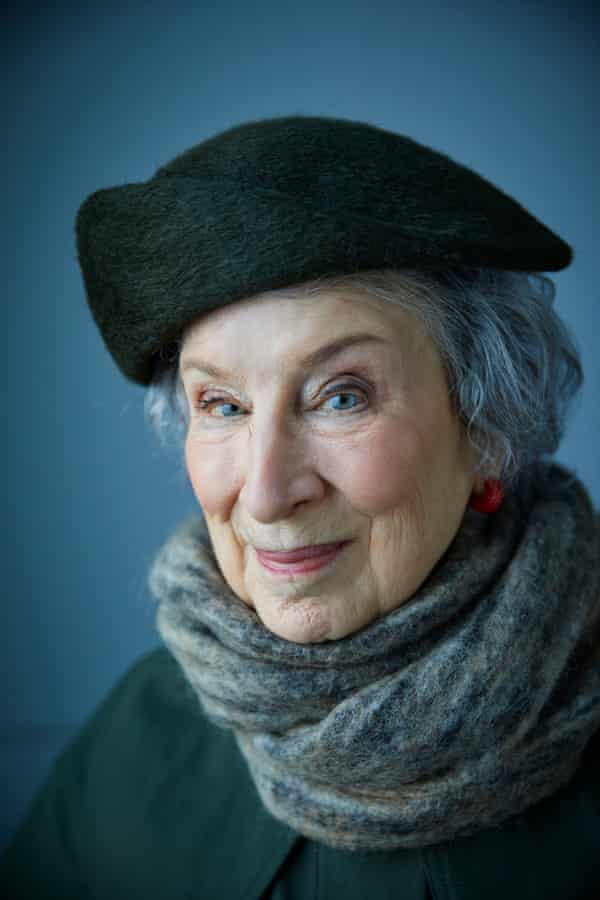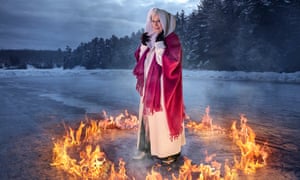This is a long feature
Margaret Atwood on feminism, culture wars and speaking her mind: ‘I’m very willing to listen, but not to be scammed’
"At 82, the Canadian author has seen it all - and her novels predicted most of it. Just don’t presume you know what she thinks, she tells Hadley Freeman
‘How are you? You’re named after Ernest Hemingway’s first wife,” Margaret Atwood announces by way of a greeting when we meet on a hotel’s heated patio near her home in Toronto. Atwood, 82, has often been described as a prophet, thanks to her uncanny ability to foresee the future in her books.
When Trump supporters stormed the Capitol in January 2021, it looked, terrifyingly, like a scene out of The Handmaid’s Tale, when the government is overthrown and the dystopian land of Gilead is founded. She seemingly predicted the 2008 financial crash in her nonfiction book Payback: Debt and the Shadow Side of Wealth, published that year. Atwood has always scoffed at any suggestion of telepathy, pointing out that every atrocity in The Handmaid’s Tale had been carried out by totalitarian regimes in real life, and she “predicted” the crash by noticing the number of adverts offering to help people with their personal debt. But as she stands in front of me, snowflakes glittering around her like stars, the flames of the hotel’s gas heaters leaping on either side of her, dressed all in black save for her little red hat, correctly guessing who I’m named after, she certainly seems to have a touch of magic about her.
Playing with fire: a Margaret Atwood guest edit
Ahead of the publication of her new book, Burning Questions, the author gives an exclusive interview to the Guardian's Saturday magazine, as well as bringing together her favourite thinkers to share their vision for the future, and introducing a report on access to abortion
How did she know about the Hemingway connection?
“Because I’m deep into Martha Gellhorn,” she says, launching into a long discussion about the celebrated war correspondent and Hemingway’s third wife. Atwood isn’t writing a book about Gellhorn (yet), but she found a letter from her to the father of her late partner, Graeme Gibson, who died in 2019, and is now a Gellhornologist. After six or so minutes, I wonder if we’ll ever talk about anything else, but Atwood has a regal quality that makes interruption unthinkable. It does not, as I later learn, render argument impossible.
Proceedings begin peacefully enough. Atwood and I are meeting because this month she will publish her latest collection of essays, Burning Questions, a 500-page doorstopper that gathers together her nonfiction output from the past two decades. During this period she also published five novels, one novella and Payback. Atwood is arguably the most famous living literary novelist in the world and unarguably one of the most prolific: in her half century of writing, she has published, on average, a book a year. She has won the Booker twice – in 2000 for The Blind Assassin and in 2019 for The Testaments, controversially sharing the prize with Bernardine Evaristo for Girl, Woman, Other. Atwood shrugs off that literary hoo-ha – “So fun! Bernardine’s a great gal” – and adds that she is “a veteran of not winning the Booker”. Of course, being a veteran of not winning means being a veteran of being shortlisted, which in Atwood’s case is four times on top of her wins. So when she describes herself to me as a “grade-A procrastinator and goof-off”, I say that seems unlikely, given how much she writes, and she looks abashed. “I know – it’s horrible, isn’t it?” she says. When I ask how she managed to whittle her essays down to a mere 500 pages, she cringes again at her own productivity. “Horrible!” But adds, “If writing wasn’t a pleasure, I wouldn’t do it.”
And Atwood’s writing is – unfailingly – a pleasure to read. She is one of the all-time great storytellers, a truth sometimes obscured by her highbrow reputation. Whole days of my life have been lost to her novels, including Alias Grace, Cat’s Eye, The Robber Bride and The Blind Assassin. When it comes to making you want to know what happens next, Atwood is up there with Stephen King and JK Rowling. She has written in every literary genre, from poetry to sci-fi to mystery. But there is one connecting thread: many of her novels are told using a retrospective narrative, with a character looking back on their former life while trying to make sense of their current one. It is a device that winks at Atwood’s love of Victorian literature, but it’s also how she thinks, always looking forward, but also looking back. When she writes her books, she types up yesterday’s handwritten pages and handwrites the pages for tomorrow. “The rolling barrage!” she laughs. When we talk about modern social movements, she refers back to the French Revolution; when we talk about the rollback of abortion rights in the US, she cites Nicolae Ceaușescu, the notoriously anti-abortion dictator of Romania from 1974 to 1989. “As you may have noticed, I like to do my research,” Atwood smiles, after we’ve segued into long discussions of Stalin, or Mao, or Robespierre. It’s all fascinating, and evidence of her tirelessly curious mind. But it can also feel as though she is building a wall of words to protect herself from prying questions. At one point, when she pauses in the middle of such a digression, I ask if her research into Gellhorn has been a way to stay close to Gibson.
“Of course. No-brainer. Next question.” She picks up the menu. “Shall we split the ubiquitous avocado toast?”
Atwood always has a book on the go, so even though she has only just received the finished proofs of Burning Questions, she is already deep into her next project: her 10th collection of short stories. When it comes to work, she is indefatigable: “This has sometimes been resented by friends and family. But I come from a hard-working background and a hard-working generation. I always knew I should be able to support myself.” She has “no time routine, but a space routine: a certain number of pages or words. No cork-lined Proustian writer’s haven. For me, it’s roll up sleeves and get it done.”
Yet it’s a mystery how she does get it done, considering how deeply involved she is with the world around her, as Burning Questions proves, with its clear-eyed essays about the climate, feminism and the future. By now, Atwood has more than earned the right to lock herself away in an ivory tower, but she keeps jumping into the mud. She has been involved in multiple controversies, due partly, but by no means solely, to her fearlessness in addressing hot-button issues in her writing. During the Trump era, her name became a byword for the feminist fightback against the creep of misogynistic legislation that sparked many comparisons to Gilead; Handmaid’s Tale costumes became a staple of pro-choice protests. Both that book and Alias Grace were turned into TV series, propelling her into a stratosphere of celebrity unknown to most authors. When The Testaments, her keenly awaited sequel to The Handmaid’s Tale, was published in 2019, bookshops stayed open until midnight so fans could get copies as soon as they arrived, a privilege usually granted only to titles such as new Harry Potter books. Her fearlessness has not worked against her commercially.
“Not fearless,” she corrects me. “I am afraid of thunderstorms, bears, certain kinds of heights, also totalitarian forms of government, the behaviour of mobs when they get going. What passes for fearlessness is sometimes just naivety. I am not suspicious or cautious when others might be. Also, I don’t have a job, so I can’t be fired.”
I don’t like to favouritise my books. The others would be out to get you: ‘How could you? I spent all this time with you!’
This may partly explain her fondness for signing politically charged open letters, such as, in 2020, the so-called Harper’s letter about cancel culture, which denounced “an intolerance of opposing views” on the left, and, three months later, another one expressing support for non-binary and trans people, written as a critical response to an essay by Rowling explaining her views on gender. Atwood’s involvement made those letters headline news. Given that the two ostensibly contradicted one another – and we’ll get back to this – she arguably annoyed everyone. “People want you to be on their side, which to them means you have to be their puppet. Not a good fit for me,” she says. She is also a regular tweeter, addressing controversial subjects – politics, gender – most well-known people steer clear of. The week before our interview, Atwood spent almost an hour on Twitter, arguing with strangers about the environmental cost of building more housing in Toronto. When one anonymous tweeter bluntly informed her she wouldn’t be able to control what happened to the land after she died, Atwood wrote back “I … wouldn’t … be … too … sure … of that! I … may … retuuurn … (creaky door sound)” and added a spooky ghost emoji.
Does she ever think: maybe I should make life easy and not comment on this or that controversial issue, but instead focus on my novel?

“Oh, I always think that,” she says. . .
Read more >> https://www.theguardian.com/culture/series/playing-with-fire--a-margaret-atwood-guest-edit






No comments:
Post a Comment